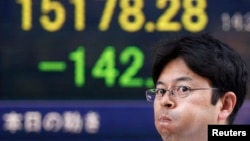A United Nations survey for Asia Pacific nations finds economic growth in the region remains subdued amid calls on governments to reform tax systems, reduce income inequities and boost employment, especially for the young unemployed. The U.N. says that although China and India are expected to experience steadier growth, the Russian Federation, faced with ongoing geopolitical conflict, is showing little growth.
The report, released by the UN's Economic and Social Commission for Asia and the Pacific (UNESCAP), says sluggish growth in major industrialized economies is spilling over and holding back growth in the Asia Pacific region.
The U.N. says growth in the developing economies, including China and India, is also set to be hit by a tightening of U.S. monetary policy, as the program of quantitative easing meant to spur U.S. growth is tapered back. At the same time, restrictive trade policies in developed economies will undermine exports.
Shamshad Akhtar, UNESCAP executive secretary, said average forecast growth of 5.8 per cent is still below that seen before the 2008 financial crisis, and is not sufficient to ease high unemployment rates, especially among the young.
"There are some worries… for one, the growth is subpar when you compare it with the pre-crisis period where it was much higher. So it's a region that has a potential to deliver much higher growth and we obviously need much higher growth to solve job problems and other attended problems," said Akhtar.
Youth unemployment remains a key issue. The report says nearly 717 million of the region's population are young men and women aged 15 to 24 years. The report calls for "active labor market programs" linking education, training and skills development, and overcoming gender inequalities in education.
India's growth is forecast for 2014 at 5.5 per cent, marginally higher following the election of a pro-business government led by Prime Minister Narendra Modi. Akhtar said to spur growth the government needs to ease investment restrictions and reduce bureaucratic red tape.
"India needs to open up as much as possible. India needs to welcome more foreign and domestic private investment. It needs to resolve the age-old practices of ineffective clearance mechanisms. Openness, transparency, predictability of the investment policies could be quite critical," said Akhtar.
In China, many have expressed worry that overinvestment in real estate and housing has created a dangerous economic bubble. The U.N. report forecasts growth at 7.7 percent for the year. Akhtar said China's outlook remains positive with the government controlling policy, but she raised concerns if growth further slowed.
"China has been able to intervene when required to stimulate the economy, either for domestic reasons or for keeping the global economy going. So I think it's a pretty reasonable process that's underway. [But] I think if growth got more compressed that there would be more worries because China is a large economy,” said Akhtar.
Of key concern is the economy of the Russian Federation, which is now in recession with growth forecast of less than one per cent in the year. The growth rate stands in sharp contrast to over 7 per cent prior to the 2008 financial crisis and 3.5 per cent two years ago.







